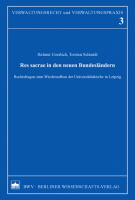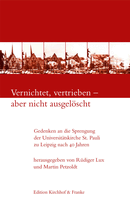Goerlich, Helmut; Schmidt, Torsten: Res sacrae in den neuen Bundesländern - Rechtsfragen zum Wiederaufbau der Universitätskirche in Leipzig. Berliner Wissenschafts-Verlag. Berlin 2009. 69 pp ISBN: 978-3-8305-1703-0
This publication by Professor Dr Helmut and Mr Torsten Schmidt shows for the first time and in a comprehensive way the constitutional and canonical legal framework for the use of the University Church in the context of German law and especially the established legal relationship between the Evangelical Lutheran Church of Saxony and the Free State of Saxony in terms of canon law and German constitutional law. Of particular importance is the section on the construction and future use of the campus construction project at the Leipzig Augustus Square as the 'Assembly Hall * University Church of St Paul'. This work makes an outstanding contribution for the legal foundation and objectivity of the current debate on the new University Church in Leipzig.
The study shows that the provision of public funding for the recovery and maintenance of a University Church on the campus of a university are in the public interest and not contrary to the necessary ideological and religious neutrality of the state. The jurisprudential work of Helmut Goerlich and Torsten Schmidt uses the German legal concept public ownership to draw conclusions of particular importance and significance: The right of the University Church, demolished in 1968, to be used for purposes of church property (res sacra) is valid to this day! There has never been a contractual waiver of rights or a unilateral waiver of such rights on the part of the Church. Likewise the University Church has never been de-consecrated. The present study affirms that the construction of the component 'Assembly Hall * University Church of St Paul' at the Leipzig Augustus Square revives the old dedication of the University Church. The Evangelical Lutheran Church in Saxony holds, therefore, public ownership over this component and may define, among other things, the conditions for liturgical use, which they themselves consider uninterrupted, as required. The use of the Church arises here from its historical stock, but is also limited by the simultaneous secular academic use of this site, which has been established over centuries. The conditions for the uninterrupted practice of faith in a sacred space as the University Church of St Paul are determined in accordance with a long-established law of the Federal Constitutional Court solely in accordance with the identity of the church, not in accordance with the understanding of the state or a secular university. The authors argue that it is therefore, for example, only for the church to determine whether and where the pulpits and altars are set up or what other properties are to be shown in a sacred space such as the University Church of St Paul in Leipzig. Against this legal background, Goerlich and Schmidt assess the recent decision-making processes at the University Church of St Paul in Leipzig at the end of their work as follows:
'The processes of decision-making with regard to the establishment and equipment of the future university church appear to be strange and incomprehensible. The Free State of Saxony and the University of Leipzig are building a sacred space for Protestant worship, without including the Evangelical Lutheran Church of Saxony, whose identity is ultimately relevant and decisive, in the relevant decisions. What equipment the sacred space is to have is dealt with by university committees, and agreed between decision makers and planners of the university and the State of Saxony as the owner of the real estate and in charge of construction management, yet the Evangelical Lutheran Church of Saxony is by and large not consulted.'
The authors recommend taking into account the 'principle of amicable solution', according to the Treaty between the Evangelical Church of Saxony and the Free State of Saxony, rather than declarations of intent, which are not legally binding and open to arbitrary interpretation, to come to a final and legally binding agreement between the Free State of Saxony and the Evangelical Lutheran Church with regard to the design and use of the University Church of St Paul in the component 'Assembly Hall * University Church of St Paul'.
The Foundation 'University of St Paul, Leipzig' concurs with this recommendation. The relevant discussions and negotiations of the parties should accept the public right of property held by the Evangelical Lutheran Church and as soon as possible come to legally binding regulations with regard to the design and principle use of the 'Assembly Hall * University Church of St Paul' in Leipzig. In the light of this study the Foundation 'University Church of St Paul, Leipzig' holds that it would be helpful if the Evangelical Lutheran Church was included more than hitherto in the decisions of the interior design and use of the 'Assembly Hall * University Church of St Paul'.
The study shows that the provision of public funding for the recovery and maintenance of a University Church on the campus of a university are in the public interest and not contrary to the necessary ideological and religious neutrality of the state. The jurisprudential work of Helmut Goerlich and Torsten Schmidt uses the German legal concept public ownership to draw conclusions of particular importance and significance: The right of the University Church, demolished in 1968, to be used for purposes of church property (res sacra) is valid to this day! There has never been a contractual waiver of rights or a unilateral waiver of such rights on the part of the Church. Likewise the University Church has never been de-consecrated. The present study affirms that the construction of the component 'Assembly Hall * University Church of St Paul' at the Leipzig Augustus Square revives the old dedication of the University Church. The Evangelical Lutheran Church in Saxony holds, therefore, public ownership over this component and may define, among other things, the conditions for liturgical use, which they themselves consider uninterrupted, as required. The use of the Church arises here from its historical stock, but is also limited by the simultaneous secular academic use of this site, which has been established over centuries. The conditions for the uninterrupted practice of faith in a sacred space as the University Church of St Paul are determined in accordance with a long-established law of the Federal Constitutional Court solely in accordance with the identity of the church, not in accordance with the understanding of the state or a secular university. The authors argue that it is therefore, for example, only for the church to determine whether and where the pulpits and altars are set up or what other properties are to be shown in a sacred space such as the University Church of St Paul in Leipzig. Against this legal background, Goerlich and Schmidt assess the recent decision-making processes at the University Church of St Paul in Leipzig at the end of their work as follows:
'The processes of decision-making with regard to the establishment and equipment of the future university church appear to be strange and incomprehensible. The Free State of Saxony and the University of Leipzig are building a sacred space for Protestant worship, without including the Evangelical Lutheran Church of Saxony, whose identity is ultimately relevant and decisive, in the relevant decisions. What equipment the sacred space is to have is dealt with by university committees, and agreed between decision makers and planners of the university and the State of Saxony as the owner of the real estate and in charge of construction management, yet the Evangelical Lutheran Church of Saxony is by and large not consulted.'
The authors recommend taking into account the 'principle of amicable solution', according to the Treaty between the Evangelical Church of Saxony and the Free State of Saxony, rather than declarations of intent, which are not legally binding and open to arbitrary interpretation, to come to a final and legally binding agreement between the Free State of Saxony and the Evangelical Lutheran Church with regard to the design and use of the University Church of St Paul in the component 'Assembly Hall * University Church of St Paul'.
The Foundation 'University of St Paul, Leipzig' concurs with this recommendation. The relevant discussions and negotiations of the parties should accept the public right of property held by the Evangelical Lutheran Church and as soon as possible come to legally binding regulations with regard to the design and principle use of the 'Assembly Hall * University Church of St Paul' in Leipzig. In the light of this study the Foundation 'University Church of St Paul, Leipzig' holds that it would be helpful if the Evangelical Lutheran Church was included more than hitherto in the decisions of the interior design and use of the 'Assembly Hall * University Church of St Paul'.
Further reading:
Rüdiger Lux and Martin Petzoldt (eds): Vernichtet, vertrieben - aber nicht ausgelöscht; Gedenken an die Sprengung der Universitätskirche St. Pauli zu Leipzig nach 40 Jahren. Edition Kirchhof & Franke, Wissenschaft Regionalgeschichte 3. Berlin und Leipzig 2008. 128 pp. ISBN: 978-3-933816-39-9
Dietrich Koch / Eckhard Koch: Kulturkampf in Leipzig. Denkschrift zur Wiederaufbaudebatte Universitätskirche St. Pauli. Leipzig 2006. 172 pp. ISBN 3-931801-20-9
Frank Zöllner (ed): Speicher der Erinnerung. Die mittelalterlichen Ausstattungsstücke der Leipziger Universitätskirche St. Pauli. (= Beiträge zur Leipziger Universitäts- und Wissenschaftsgeschichte, Reihe B, Bd. 8). Leipzig 2005. ISBN 3-374-02328-2
Christian Winter: Gewalt gegen Geschichte. Der Weg zur Sprengung der Universitätskirche Leipzig. (= Arbeiten zur Kirche- und Theologiegeschichte. 2) Leipzig 1998. ISBN 3-374-01692-8
Landesamt für Denkmalpflege Sachsen (ed): Stadt Leipzig - Die Sakralbauten. Bd. 1. Bearbeitet von Heinrich Magirius. (= Die Bau- und Kunstdenkmäler von Sachsen. 1). München u.a. 1995 ISBN 3-422-00568-4
Katrin Löffler: Die Zerstörung. Dokumente und Erinnerungen zum Fall der Universitätskirche Leipzig. Leipzig 1993. ISBN 3-7462-1068-2
Elisabeth Hütter: Die Pauliner-Universitätskirche zu Leipzig. Geschichte und Bedeutung. Hrsg. vom Landesamt für Denkmalpflege Sachsen und der Universität Leipzig. Weimar 1993. ISBN 3-7400-0916-0 (als Dissertation bereits 1961 in Leipzig angenommen)
Paulinerverein, MDR, Bild-Zeitung Leipzig, Verlag Kunst und Touristik Leipzig (Hrsg.): Universitätskirche Leipzig - Ein Streitfall?. Leipzig 1992. ISBN 3-928802-23-2
Frank Zöllner (ed): Speicher der Erinnerung. Die mittelalterlichen Ausstattungsstücke der Leipziger Universitätskirche St. Pauli. (= Beiträge zur Leipziger Universitäts- und Wissenschaftsgeschichte, Reihe B, Bd. 8). Leipzig 2005. ISBN 3-374-02328-2
Christian Winter: Gewalt gegen Geschichte. Der Weg zur Sprengung der Universitätskirche Leipzig. (= Arbeiten zur Kirche- und Theologiegeschichte. 2) Leipzig 1998. ISBN 3-374-01692-8
Landesamt für Denkmalpflege Sachsen (ed): Stadt Leipzig - Die Sakralbauten. Bd. 1. Bearbeitet von Heinrich Magirius. (= Die Bau- und Kunstdenkmäler von Sachsen. 1). München u.a. 1995 ISBN 3-422-00568-4
Katrin Löffler: Die Zerstörung. Dokumente und Erinnerungen zum Fall der Universitätskirche Leipzig. Leipzig 1993. ISBN 3-7462-1068-2
Elisabeth Hütter: Die Pauliner-Universitätskirche zu Leipzig. Geschichte und Bedeutung. Hrsg. vom Landesamt für Denkmalpflege Sachsen und der Universität Leipzig. Weimar 1993. ISBN 3-7400-0916-0 (als Dissertation bereits 1961 in Leipzig angenommen)
Paulinerverein, MDR, Bild-Zeitung Leipzig, Verlag Kunst und Touristik Leipzig (Hrsg.): Universitätskirche Leipzig - Ein Streitfall?. Leipzig 1992. ISBN 3-928802-23-2



 Print
Print